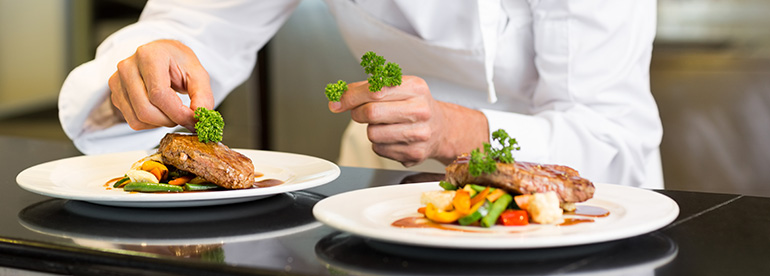When Food Safety is Paramount

18 Oct 2016
Food hygiene in the food service industry
Food safety and hygiene practices need to be considered at every stage of the global supply chain, ensuring food safely reaches the consumer. The hospitality and food service industry, in particular, faces this challenge head on, interacting directly with the consumer, preparing food onsite and delivering the final cooked product straight to the customer. This close proximity increases the pressure on the business and places additional challenges to ensure the process of food hygiene is maintained within this sector.
Food handlers are always a key risk factor when it comes to food preparation. In fact, studies have determined that improper food handling may be a contributing factor to as much as 97% of foodborne illness outbreaks in food service establishments. (Howes, McEwan, Griffiths, & Harris, 1996). The good news is that there are simple and effective steps which can reduce this risk. Since food handlers are a hazard, then changing their understanding of food safety and addressing their daily practices can reduce the level of foodborne illness risks within an establishment. Training is the obvious way to address the incorrect behaviour, as it provides food handlers with an understanding of the concept of food safety and the risks of foodborne illness. It also equips them with practical guidelines and skill sets to ensure that they are preparing food in accordance with food safety principles. Effective training will, therefore, minimise food contamination and provide protection for both the consumer and the business.
There is a real need for the food service and hospitality industry to adopt a more serious attitude towards food hygiene within their establishments and outlets. But it needs to be more than just a checkbox exercise, there needs to be real ownership of the process and the risks. Having a culture of food safety within an organisation can go a long way to building that ownership. Food establishments with a culture of food safety in place will be streets ahead of the competition when it comes to reducing their risks, not only will they understand the risks, but they will ensure they implement strategies such as staff training, quality control and the implementation of a fully functional food safety management system to achieve their end goals.
If we look outside of the hospitality industry we realise that it is the consumers themselves who are unknowingly driving the need for adoption of these practices. With easy access to multiple social media platforms, consumers have more opportunity than ever to voice their opinions, pictures, experiences and dissatisfaction. And they are not alone in this; sites such as Zomato, Eat Out and Trip Advisor allow consumers to review and rate establishments online and share these reviews with thousands. With their reputation at risk, restaurants, caterers and hotels need to make sure that they are addressing food hygiene in order to keep their customers happy (and safe).
Many progressive establishments are embracing this as an opportunity, not a threat. They do this by registering for food hygiene programmes to prove their compliance. In this way, they can have their establishments assessed and prove to current and prospective customers their level of compliance with food hygiene practices, and the associated reduction in risk when eating at their venue. This type of assurance via an approved scheme provides a measurable benchmark of compliance, thus providing consumers with peace of mind and reassurance when they eat their meal. This is a smart business strategy, because after all, because poor kitchen hygiene simply does not make good business sense.
For further information about the programme visit www.intertek.com/food/hygiene-control-programme/ and to find out about our Food Hygiene: Prevention, not Cure Conference, held on 15th March, 2017 in Johannesburg, South Africa visit https://www.intertek.com/food/events/foodhygiene-southafrica-2016/.
